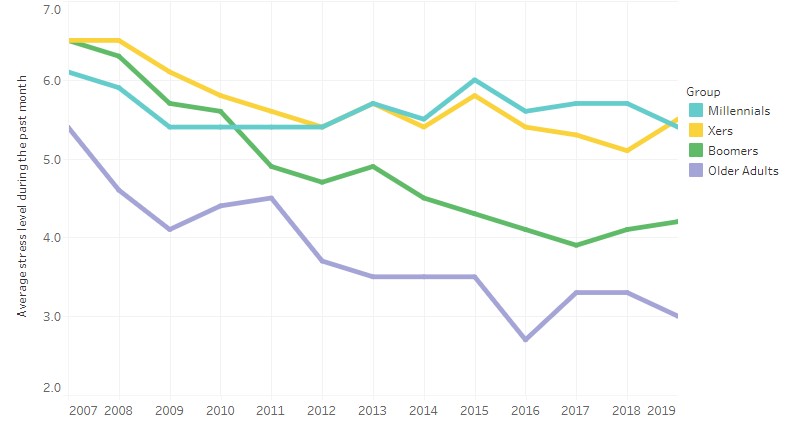Despite being used medicinally for centuries all over the world, the public perception of cannabis in the United States has largely been negative until recently. According to the Pew Research Center, two decades ago, 63% of American adults said marijuana consumption should be illegal; today, two-thirds of Americans favor marijuana legalization.
Furthermore, 70% of Americans who have tried marijuana at least once fully support legalizing recreational cannabis, and first-time cannabis consumers grew by 140% in 2018 thanks to adult use legalization.
From young adults to senior citizens, people of all ages are increasingly using cannabis. To better understand what’s driving the growing use of cannabis in the U.S., and the motivations of the people consuming it, let’s look at marijuana use at both ends of the generational spectrum: Millennials and Baby Boomers.
Why Millennials Use Cannabis
The Millennial cohort, consisting of people born between 1981 and 1996, consume marijuana for many reasons, including relaxation, stress relief, and to reduce anxiety. Millennials experience the highest stress levels on average when compared to other generations, according to the American Psychological Association.



They suffer from higher levels of anxiety in comparison to other age groups, according to the American Psychiatric Association, so it’s no surprise that they’re using cannabis for mood elevation, to improve their sleep quality, and to increase their focus and attention.
Data also suggests that younger adults may be increasingly turning to cannabis to replace alcohol as their means of achieving relaxation. From 2016 to 2017, the number of college students who drank alcohol on a daily basis decreased 4.3% to 2.2%. Furthermore, analysts at firm Cowen & Co. have suggested a correlation between declining alcohol consumption rates and cannabis use, reporting a 9% decline in binge drinking rates in states where marijuana is legal when compared to the national average.
Over a third of this cohort has used cannabis for pain management. The American Society of Anesthesiologists reports that 37% of millennials have used cannabidiol (CBD) and tetrahydrocannabinol (THC) for pain.
Younger cannabis consumers are also using marijuana to leave harmful medications behind, as they find that it’s safer and has fewer adverse effects than opioids and other problematic medications. Interestingly, medical and adult-use cannabis laws have been associated with both a decrease in opioid prescriptions (for Medicaid enrollees) and a 20-35% reduction in opioid mortality rates.
Millennials have grown up in an age where cannabis is being destigmatized. They can purchase it legally from dispensaries, discuss its health benefits with their doctors, and even invest in cannabis stocks. Now more so than ever, millennials use cannabis because they can, safely and increasingly without repercussions. In fact, researchers at Columbia University have found that daily cannabis use is the highest among young adults aged 18-34.
Why Seniors Use Cannabis
According to online cannabis marketplace Eaze, Baby Boomers (individuals born between 1946 and 1964) were one of the fastest growing segments of first-time cannabis consumers in 2018, increasing by 25% compared to the previous year. The most recent National Survey on Drug Use and Health also found increasing numbers of older adults using marijuana; about 3% of people over 65 consumed cannabis in the previous year, compared to just 1.4% in 2013.
Across all demographics, cannabis consumers cite a reduced reliance on over-the-counter and prescription medications, 71% and 35% respectively, according to Eaze insights. However, older consumers are the most likely to use cannabis to reduce or eliminate their dependence on pharmaceuticals:
- 76% reported reducing or stopping OTC medications
- 49% reported reducing or stopping prescription medications thanks to cannabis
These findings were supported by the nationwide ASA survey mentioned earlier, which found two-thirds of Baby Boomers expressed interest in using marijuana or cannabinoid compounds, including CBD and THC, to manage pain.
Similarly, 89.7% of adults over 61 who are enrolled in Colorado’s medical cannabis program identified pain as the primary or secondary symptom that they are seeking treatment for. Other primary diagnosable conditions that they listed included cachexia, cancer, glaucoma, and nausea.
And some older adults who have used cannabis medicinally over the past year did so on their doctor’s recommendation.
Boomers, like younger adults, are also shifting their opinion of marijuana as a social lubricant. Jessica Lukas, vice president of consumer insights for BDS Analytics, a cannabis consumer research company, reports that 60% of Boomers consume cannabis for recreational and social benefits. Data suggests that Boomers may actually prefer cannabis over alcohol for relaxation. In a state-wide investigation of cannabis use among older adults, researchers at Colorado University found that participants preferred recreational cannabis to the negative effects of alcohol. This may be due to an increased sensitivity to alcohol as we get older.
“As we age, alcohol is not metabolized well. This leads to higher blood alcohol levels than normal, and a higher likelihood of experiencing a hangover,” Dr. Cedrina Calder told digital publication Fatherly.
Furthermore, cannabis is 114 times safer than alcohol according to a risk assessment published in journal Scientific Reports, so opting for marijuana is gentler on their bodies.
Explore How Cannabis Can Improve Your Life
Whether you want to alleviate pain, lower stress, or feel more comfortable in social situations, cannabis can help you live a better life. Learn more about the benefits of cannabis, how to safely consume it, and the research that goes into the development of strains. Browse the educational content in our resource center, or subscribe to our newsletter by entering your email address at the bottom of our website.




